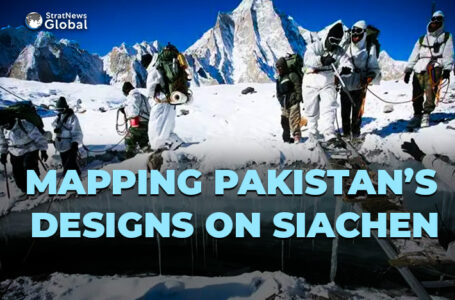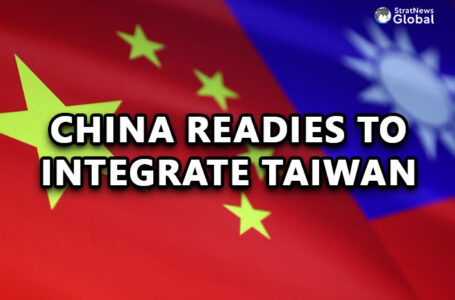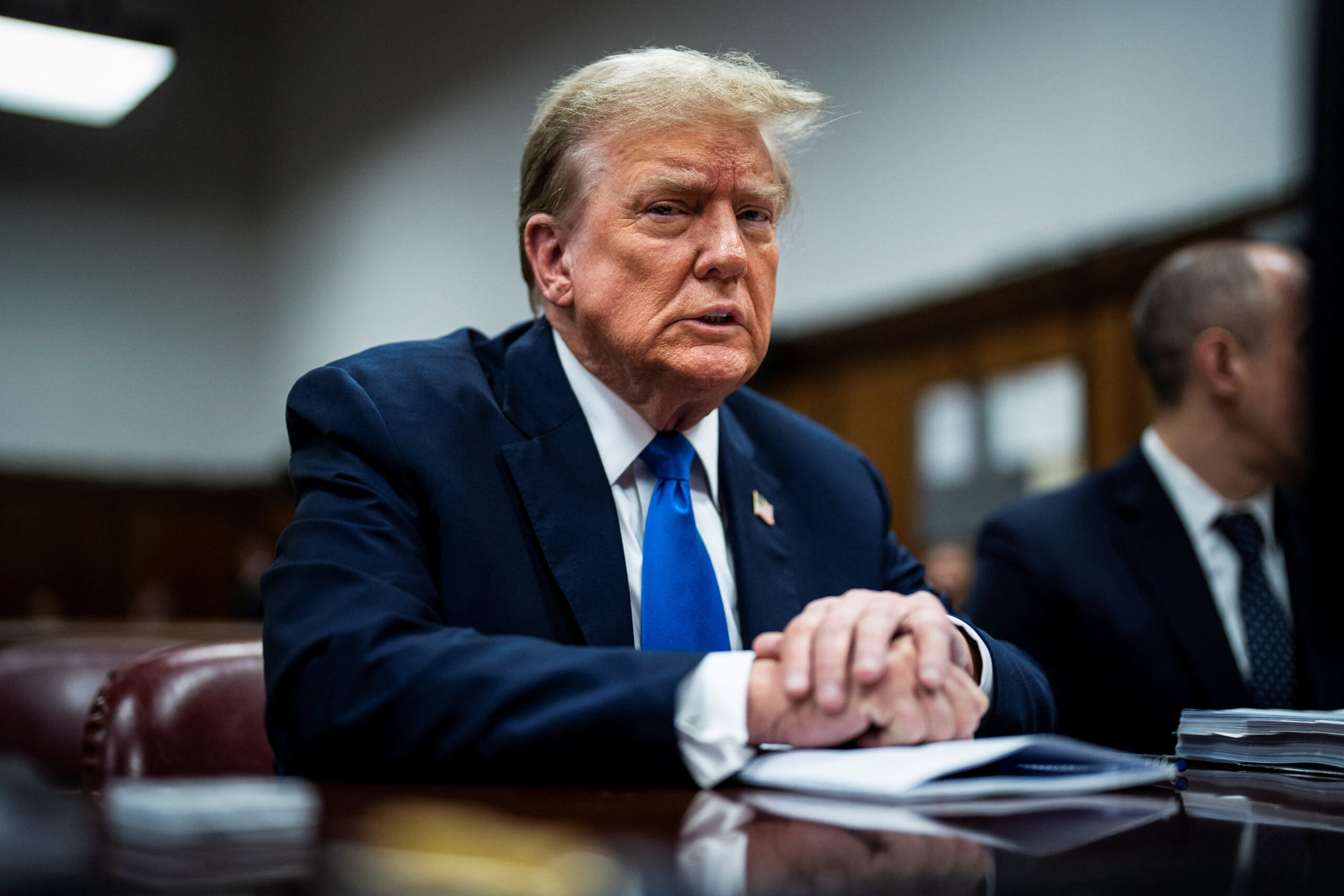We Have To Give Air Support To Ukraine, Can’t Put It On US...
China Has Physically Occupied Tibet But It Can Never Control Our Mind: Dalai Lama
His Holiness Dalai Lama speaks frankly on the future of Tibet, the possibility of his reincarnation and being the ‘longest staying’ guest of India. In conversation with our Editor-in-Chief Nitin A. Gokhale.
Transcript:
Q: Thank you very much for your time, His Holiness. It’s a privilege and an honour and always good to come and listen to you and your wisdom. You’ve spread compassion and oneness in the world for so long. Do you think the world needs more of it from people?
A: Certainly. You see, never ask what is your faith? What is your nationality? Children, as humans, brothers-sisters relate together. So that’s the beginning of our life. Then I think the problem is existing education. There is too much emphasis on differences—nationality, religious faith and, in this country, different castes. So that’s the source of problem. Actually, we are human beings, part of the human community of seven billion. One human community, we have to live side by side. Different faith, different nationality is secondary. Therefore, in education you should pay more attention to what is basic human value or India’s tradition—‘ahimsa’ (non-violence) and ‘karuna’ (compassion). When we talk about ‘karuna’, it’s not only (towards) human beings but also animals. Don’t harm and have a more compassionate attitude towards animals and also respect the environment, don’t destroy it. India’s over thousand 3000-year-old ‘ahimsa’ and ‘karuna’ that is (needed) at the individual level in order to be a happy human being; and at the global level, in order to have a happy humanity and a peaceful world, these things are very relevant. All the emphasis is on differences.
Q: But you have spread compassion for so long now, six decades, 61 years in India. And do you think this institution of Dalai Lama needs to be perpetuated, needs to continue in the coming decades also?
A: I think 1969, I expressed whether this institution of Dalai Lama should continue or not to Tibetan people and now I can say to Tibetan and Himalayan people and (people of) Mongolia, the institution at one period it developed and at one period it will go. (The institution of Dalai Lama) not important, important is knowledge. In our case, the knowledge of Buddhism in general and particularly Nalanda tradition, Sanskrit tradition, that is very scientific. I always tell people we can make distinction. In Nalanda tradition, there is a lot of explanation about human psychology, human mind and philosophy. Like quantum physics, very clear in Sanskrit tradition. And then logic. So, analyze everything, analyze, not just faith and easily accept, no. Buddha himself is telling us you should not accept my teaching out of faith or devotion but rather thorough investigation and experiment. So that is a very scientific. So, now the knowledge, Buddha Dharma, we can continue. So, that is important, the institution including Dalai Lama institution relates with individual, not important. I do not think very important about Buddha Dharma, no. In case 15th Dalai Lama comes, who is a very naughty person then there is no use. Now, I think last 13th Dalai Lama somehow quite naughty.
Q: But you yourself have a streak of happiness and you’re always smiling. That’s the thing that people are looking forward to but so when people say that there could be a reincarnation and how does reincarnation work? Do you think that the reincarnation should be with the Chinese people or do you think the reincarnation will happen automatically, according to your teachings?
A: Like the first Dalai Lama, when he became old, he occasionally expressed it. Then some of his disciples, great scholars, they expressed to him: you already have certain sort of clear indication you go to heaven, Sukhawadi. Then he answered, I have no desire to be born Sukhawadi, my desire is to be born in an area where there is more suffering so I can use something to serve the concerned people. That was his wish. In my own case, I’m a Buddhist monk, Buddhist practitioner. I have the name of the Dalai Lama but I consider I’m a simple Buddhist monk. And daily basis practice. So my sort of determination, my prayer, there was sort of prayer mentioned. So long as space remains, I will remain in order to serve. That is also determination, I practise that. So, therefore, I am 100 per cent sure that in my next life I can be useful to the community. That’s my wish. I don’t care about this institution. All those Nalanda masters, no one had an institution. So institution has some connection with political matter. Since 2001, I totally retired from political responsibility. And I also made clear, I decided that in future, in case there is a Dalai Lama, (they will have) no political power. We must have democratically elected political leadership. So I already sort of retired and we have already achieved at least among refugee community, we have elected political leadership. So, in the future if Chinese allow, Chinese don’t, their own leader also (hasn’t been chosen) not through free election. And I think as far as democratic practice is concerned, we are more advanced, we have a freely elected leader, political leadership. China has a totalitarian system. Therefore, I’m not much concerned about the institution of the Dalai Lama.
Q: But when the Chinese say that we will choose the next Dalai Lama, what is your reaction to that?
A: Panchen Lama. I recognized one boy through traditional way, investigation. And then Chinese officials recognised another Panchen Lama. But among Chinese, they usually describe him as a false Panchen Lama or fake, among Chinese themselves. And Tibetans do not have much of a faith (in him). So in case the Dalai Lama institution remains and the next (15th) Dalai Lama is decided by the Chinese, then Tibetans will not believe that.
Q: Exactly, they do not accept the Chinese choice. But coming to the Chinese dealings with you and the way they describe you sometimes they describe you as a separatist, a splittist. And you’ve been hearing this for a long time. But do you think there is any chance, first of all do you desire to ever go back to Potala Palace or to Lhasa?
A: Since 1979, we developed direct contact with the Chinese government. That also, Pandit Nehru advised me. America will not fight with China, with Chinese in order to liberate Tibet, he told me. Yes. Sooner or later you have to deal with China, Chinese directly. Very practical. So then, in early 50s, or no early 60s when we raised the Tibetan issue at the UN for a few years Pandit Nehru said that won’t be much useful. Then in 1974 we decided not to raise the Tibetan issue at the UN, we tried direct contact with the Chinese government in case there’s some possibility. So, in 1974 we decided not to seek separation, independence. We did not accept the existing political situation. Then, meaningful autonomy. And that also not only about 2 million Tibetans in the autonomous region, but those areas the Chinese constitution recognised as Tibetan areas. Now, all together the population was around six to seven million. In Chinese constitution is it provided that all these areas be considered Tibetan areas. So, autonomous region, autonomous district, autonomous procedure. So, we should have, since the constitution recognises, as a Tibetan group, the same right to preserve our own culture, our own language. And then most important is Tibetan knowledge that originally came from Nalanda. I think the marvellous knowledge of Nalanda like psychology, philosophy, quantum physics, all these academic subjects these days are made for distinction, religion and academics. There is a certain style of Buddhist practice. In the eighth century, the Tibetan emperor invited the top master of Nalanda to Tibet. Then the eighth century Chinese Emperor was determined, as far as Buddhism is concerned not through Chinese language but directly from Nalanda. So when Nalanda Master Santarakshita reached Tibet, he advised the Tibetan king, since you have your own script, instead of studying Sanskrit, Pali, you should translate it into Tibetan. So then the translation started. Eventually, 300 volumes. These are the sources of Buddhist knowledge. Buddhist population in China a few years ago, I think three years ago, one Chinese University in Peking survey said over 300 million. Since then, there has been a rapid increase year by year in Buddhist population. Today in China the Buddhist population I think is around 600 million. China is a Buddhist country; Buddhism was brought to China by one Chinese scholar. He came to India and joined Nalanda and studied and some historian say he even met the top student, scholar student of Nagarjuna, Naga Bodhi, his top sort of disciple, great scholar. So, Chinese monk Xuanzang, when he came to Nalanda, that top scholar was very old but still there. So, he met and he received some teaching. So, Tibetan Buddhism as I mentioned earlier 8th century Nalanda master introduced. The Chinese Buddhists also use Xuanzang who studied in Nalanda, so same source. Today many Chinese follow Tibetan Buddhism and whenever sort of opportunity comes, Chinese from Mainland China come to see them. So therefore, now regarding political matter, among the top leader in Chinese they have already developed some kind of awareness, in the past over 60-70 years their policies regarding Tibet were unrealistic. Now, they are thinking seriously, trying to follow a more realistic approach about Tibet. So therefore, now since last few years, as I mentioned earlier 1979, so since then how continuously for official or formal sort of delegation I went there and now individually some Chinese officials also come here, meet me. They are very much eager about my return. I always keep telling them I’m very much willing to visit China and meet those Chinese Buddhists, Buddhists and also some scholars but about my return it’s too early to decide. I love India’s freedom and have enjoyed it for over 60 years now. As a result, I keep meeting with different people. And today one of my old friends, a Chinese, told me to visit China. Very important, but the permanent residence must be India. That person used to express to me, the Dalai Lama’s big name you see created by Westerners, so I must go to Western countries.
Q: I believe you used to know Xi Jinping, his father in the 1950s How was it, I mean how did you know him?
A: When in 1954 I went to China, I developed very good relation, personally relation, with Mao Zedong and I really admire him as a revolutionary and Marxist, wonderful. On the last day, I was to leave the next day from Peking, Mao Zedong called me. The official farewell was already sort of done but all of a sudden I received one message from Mao Zedong’s office. Mao Zedong was waiting there to meet me and I went. I was in a meeting when all of a sudden, one messenger came and said Mao Zedong was waiting to see me. I went and he was waiting there; he gave me very useful advice: after return to Tibet how to develop relation with the public and listen to public’s views. Also he told me then that he wanted to keep me to keep contact with him directly. And then he mentioned to me: your mind is very scientific; religion is opium. And that shows sort of my intelligence that he felt I’m non believer. I deceived him. So he told me you are very scientific-minded; religion is poison. At that moment, I l was shocked and then in order to hide my face I looked down at my notebook and made notes in order to hide my expression. At that time, I was really very much impressed about Marxism. So I expressed I want to join Chinese Communist Party in 1954-55. The Chinese officials concerned said no hurry, no hurry. After I came to India, I met Jyoti Basu, Indian communist, on a few occasions. Marxism dedicated to socialism and equal distribution and the emphasis on right of working class people, so that’s right. Not only in India but everywhere there is a huge gap between the rich and the poor, that’s the source of suffering.
Q: So what would you advocate for India? You have lived here; you’ve taught here
A: Now, when we came to India, crossed the Indian border at Taiwan, we felt India was our spiritual home. We always look at India as a sacred land, ‘Arya bhoomi’. In a way, we are refugees in our sacred country where all our knowledge comes from. So we are very happy to be here. Then, I’m the longest guest of Indian government.
Q: They don’t mind. I’m sure that nobody minds in India that you are here. We really love you and we revere you when you’re here but you are not a guest.
A: Sometimes I express to Indian officials that if some day the government of India says I am no longer guest of the government, I have to think whether I should go. I now have four commitments. Number one commitment. I’m one of the 7 billion human beings. Human beings by nature, scientists say, are social animals. Basic human nature is to be more compassionate. And having a more compassionate mind makes physical condition better; constant anger and hatred is very bad for the immune system, the scientists say. So my number one commitment is to try to promote basic human values, compassion. Again, according to Indian tradition in a secular way mainly based on science. That’s my number one commitment. I think a number of my friends in different countries are now really showing some interest about basic human values. Then, my second commitment is religious harmony. Now I am fully convinced that religious harmony is possible. Look at India, all major religions live together with mutual respect, wonderful. The world needs that Indian tradition, religious harmony. When I saw a TV Shia and Sunni, unfortunately in Burma, Buddhist vs Islam, very sad. All religion carry the message of love. That tradition itself now causing division, very sad. So we need special effort to promote this harmony. India is example. So that’s my number two commitment. Number three commitment regarding Tibet. Now my main concern is Tibetan environment. High altitude, dry climate, some Indian friends say under such sort of conditions, the damage to environment and revival because of high altitude and dry climate take longer time. So, ecology in such condition is quite delicate, so we should pay more attention to preserve ecology and the environment. And then Tibetan knowledge, as I already mentioned, all Indian ancient Nalanda knowledge we kept. Now the whole world, I think the Nalanda knowledge is available only among Tibetan tradition. Burma, Sri Lanka, Thailand, Laos, Cambodia. And China, as I meant earlier, is Nalanda tradition, but communist country. And then Mongolia also difficult. So Tibet, actually see, we also lost our country. But a handful of Tibetan here, we kept the Nalanda tradition intact. We studied Nalanda tradition, psychology, and philosophy and so on at least for 20-30 years and we have still kept these traditions. That I feel is very important. Although we Tibetans carry these things, the subjects have great potential to bring peace among humanity in a secular way. Then my fourth commitment: I feel India is the only nation that can combine modern education and ancient Indian knowledge—how to sort of keep peace of mind through the practice of ahimsa and karuna. Over 3000 years, this country developed the practice of Samatha, practice of Vivasana, Sandhya philosophy, Sandhya tradition and then Jain-Buddhist tradition, on the basis of ahimsa and karuna. These are Indian traditions. Now, India should combine modern education and ancient Indian knowledge. Modern education brings material development; ancient Indian knowledge brings inner peace. So India has great potential to offer to the world how to get peace of mind. In order to do that, firstly within India should sort of start through education, not through prayer, not through ritual but through education, the combination of modern and ancient Indian knowledge. So, my fourth commitment is revival of ancient Indian knowledge through education.
Q: That’s a very big commitment and I think you will be able to lead that. But as somebody who’s respected the world over, how do you see the next generation of Tibetans taking forward the struggle for more autonomy?
A: Tibetan determination is very firm. Generations have passed since the 1950s but the new generation, their determination is as strong as the previous generation, very strong. So at the physical level Chinese occupied but Tibetan spirit at the mental level, they never controlled. So, the Tibetan spirit—combination of Buddhism, Buddha Dharma, Nalanda tradition—is very strong. Now, China, the invader, they themselves— more and more in number—follow Tibetan traditions. So, the Chinese controlled Tibet by weapon, we influence their mind. So in the long run, our influence is stronger than their weapon. That’s quite clear. Absolutely, 100 per cent. In the early 1970s, we decided not to seek separation but remain within People’s Republic of China. As Pandit Nehru’s advice, that’s a realistic approach. Not only that, I think it’s of immense help to Chinese Buddhists.
Q: So one final question. I know your time is very precious and I’m grateful for your time but India has been your home for 61 years now. What advice would you give to Indians and the Indian government?
A: India is the most populated democratic country, wonderful. And a prime minister mentioned at the UN, India is the land of Buddha. In education India should revive the ancient teachings. In the past, we reconsidered Indians as our guru, our teacher. We considered ourselves chela (disciple). I usually describe we are reliable chela because we kept all ancient Indian knowledge. So that’s sufficient to prove we are reliable chela. Traditionally, you are our guru but now you have modernized. You lost this knowledge. So now in reality, the traditional chela has now become guru, traditional guru has now become the new chela. So that’s my commitment, India must secularly revive ancient Indian knowledge, how to keep peace of mind.
Q: So do you ever feel let down by India, have you ever felt disappointed?
A: No, no, never. I think now, perhaps I think frankly speaking, Dalai Lama become more popular in the whole world. So India also needs that person.
Q: That’s true. Thank you very much. Thank you for your time and your blessings. Thank you.























